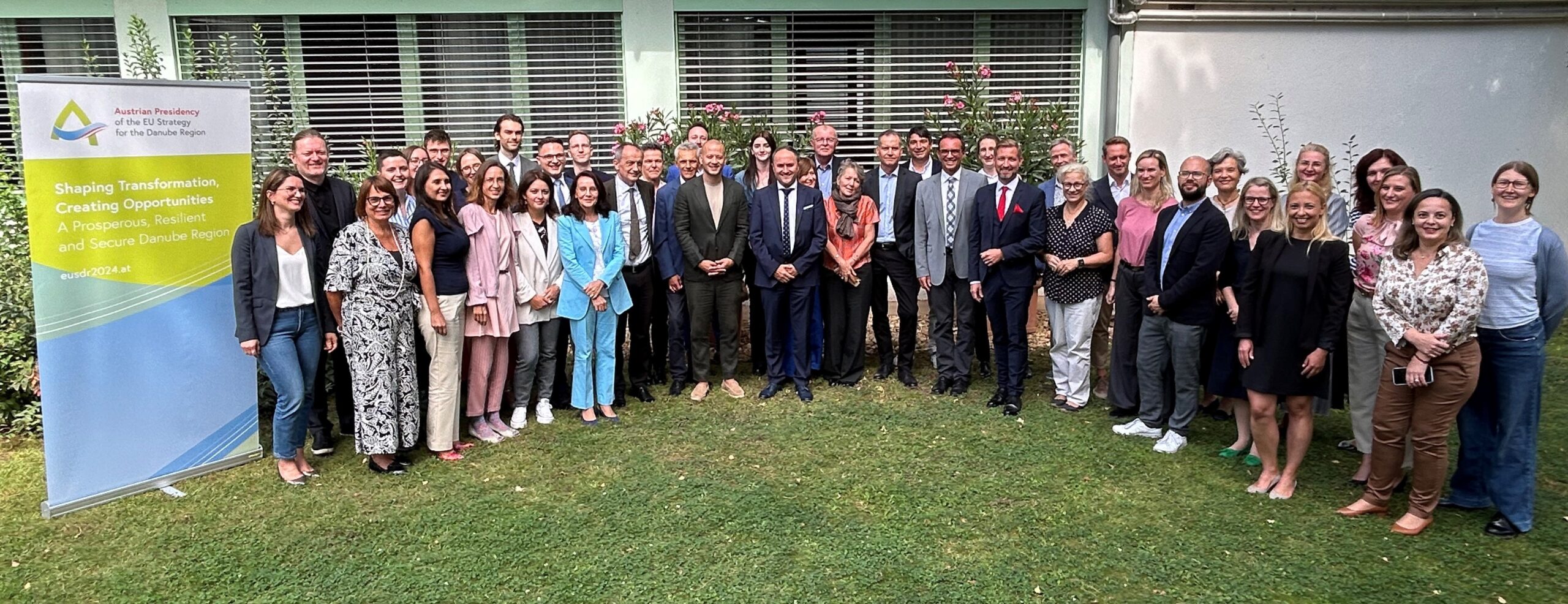On 11 and 12 September 2024, the Priority Area Coordinators met for their annual meeting, which was organised under the Austrian EUSDR Presidency, having the support of the Burgenland Region and the Danube Strategy Point (DSP).
Chaired by the representatives of the Austrian EUSDR Presidency, the meeting started with a brief introduction from the Mayor of Illmitz. The DYC member, Pejo Bosnic made a short presentation related to the DYC activity over the year and their future plans, with focus on post-2027 Cohesion Policy and the events organised this fall in Brussels. He also raised the topic of promoting the cooperation among DYC members and Priority Areas.
Chaired by the representatives of the Austrian EUSDR Presidency, the discussions continued on topics relevant for the PACs like countries’ involvement in Steering Group meetings, cooperation with relevant Directorates General from the European Commission, the progress of the PACs projects and possibility of improving the progress reporting, increased cooperation among the Governance structures.
The meeting proceeded with a presentation of the Embedding Paper 2024 developed under the Austrian EUSDR Presidency and discussions with the Priority Area Coordination teams on possible activities and needs of the Priority Areas in relation to the future alignment of the Danube Region Strategy and associated funding sources.
The subsequent item on the agenda focused on the monitoring and evaluation of the EUSDR. A representative from the European Commission presented the latest details regarding the 5th Commission Report on the Implementation of EU Macro-regional strategies, which includes the Danube Region Strategy. Following this, the DSP representative provided an update on the EUSDR Implementation Report for 2022-2023. The session concluded with a report on the EUSDR ongoing evaluation process and its implementation.
The presentation delivered by the representatives of the Interreg Danube Region Programme (DRP) focused on the current status and progress of the DRP as of September 2024. The main objectives of the session were to engage stakeholders and gather feedback on transnational cooperation in the Danube Region. A series of discussion questions aimed at exploring opportunities and challenges in cooperation, such as identifying unexplored potentials in the Danube Region, improving cooperation, and overcoming obstacles were addressed during the session. Information on the forthcoming two-year reviews of PACs/DSP projects and the results of the Seed Money Facility (36 proposals approved) were provided to the participants. Additionally, they announced an upcoming workshop – Maximising talent through inclusion in the Danube Region – organised by the DRP, on 8 October from 11:30 to 12:30 CET, as part of the EU Week of Regions and Cities taking place in Brussels.
The second day of the meeting continued with a follow up from the Austrian EUSDR Presidency on the initiative of identifying key messages on future perspective for macro-regional cooperation in the Danube Region post-2027.
The Austrian EUSDR Presidency has provided platforms and qualitative inputs for a debate about major trends and policy developments, which will shape cooperation in the Danube Region in the future. Therefore, preliminary lessons from the evidence of cooperation potential in the Danube Region were presented by experts.
Based on the “Regional and spatial trends in the Danube Region and related integration developments” study (developed by wiiw), the first results identified evidence-based narratives to guide future cooperation, policy-making, and development trends in the Danube Region, with a focus on regional integration, economic challenges, and future cooperation strategies. Key topics include:
- Stability and Security: The region is a link between East and West, but faces economic disparities, governance challenges, and migration issues.
- Globalisation and Technological Change: Technological advancements offer opportunities for less developed countries to catch up, but uneven digital skills and innovation capacities present barriers.
- Green Transition: The shift towards renewable energy is urgent, yet fragmented energy infrastructure and insufficient green energy use slow progress.
Further on, the study “Think Piece on the need to step up cooperation to master future challenges in the Danube Region” (developed by Spatial Foresight) found that transformations meet the Danube Region in specific ways, highlighting the importance of cooperation to shape the future. These two main ideas were developed into 10 key messages with focus on future cooperation.
The following item of the agenda involved EU enlargement and EUSDR’s role in the process. An overview of the status of EU accession for various countries in the Western Balkans, Eastern Europe, and Turkey was presented. The main points included different stages of negotiations since the 2010s, with visa liberalisation and stabilisation agreements in place or progresses registered by potential candidates (Western Balkans), further EU negotiations and talks begun in 2024 for Moldova and Ukraine (Eastern Europe). The process emphasises gradual integration into EU policies, with the Common Regional Market (CRM) acting as a stepping stone towards full membership.
The last item on the agenda of the second day of the meeting included consultations among the participants on possible topics of the future Bosnian and Herzegovinian priorities for the EUSDR Presidency, starting on 1 January 2025.
In light of the political situation in the region, all efforts will focus on transforming the Danube Region into a stable, secure, and prosperous area by building on the successes of past EUSDR Presidencies. A key focus will be advancing the EU enlargement process while also accelerating European integration. The Bosnian and Herzegovinian EUSDR Presidency will prioritize youth and youth policies to combat brain drain and retain young people in the Danube Region. Additionally, there will be a strong emphasis on enhancing the involvement of the EU Commission’s DG NEAR and related directorates in carrying out the EUSDR initiatives.
Thematic-wise the future Bosnian and Herzegovinian EUSDR Presidency will focus on security in the region (focusing on civil protection, migration management, border security, organised crime and digital security), tourism and culture (including tourism sector’s recovery in a sustainable manner and green tourism), connectivity and green transition (with the particular focus on digital, energy and transport connectivity).
As a member in two EU macro-regional strategies (EU Strategy for the Danube Region and EU Strategy for Adriatic and Ionian), Bosnia and Herzegovina will continue enhancing the cooperation between the EUSDR and the other three EU MRS.




